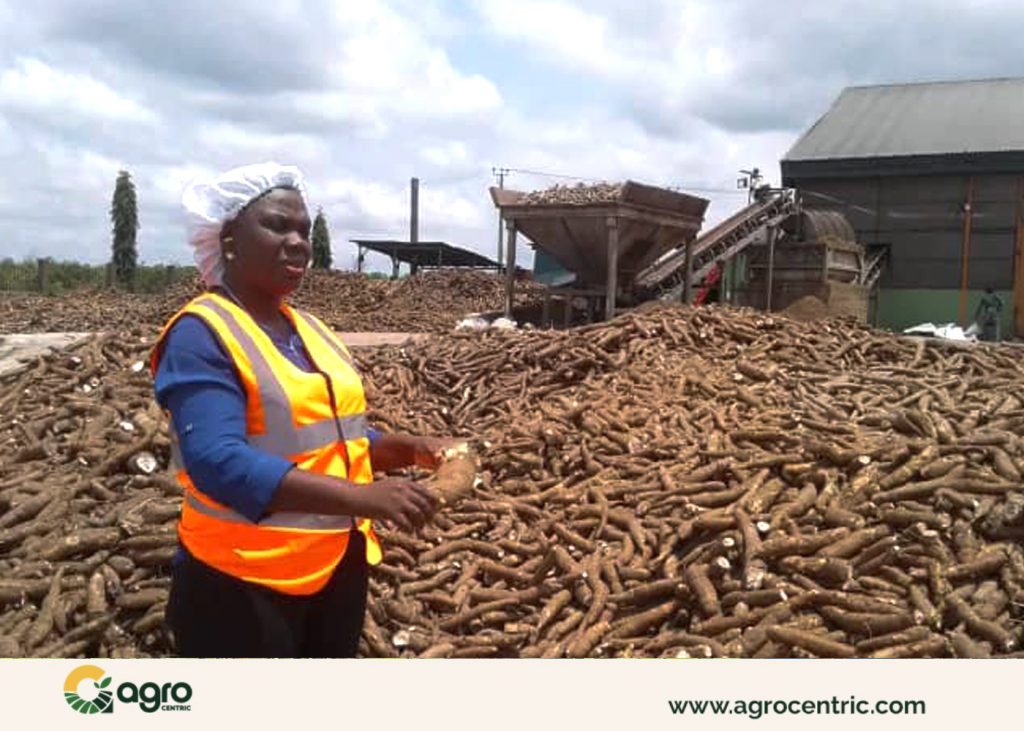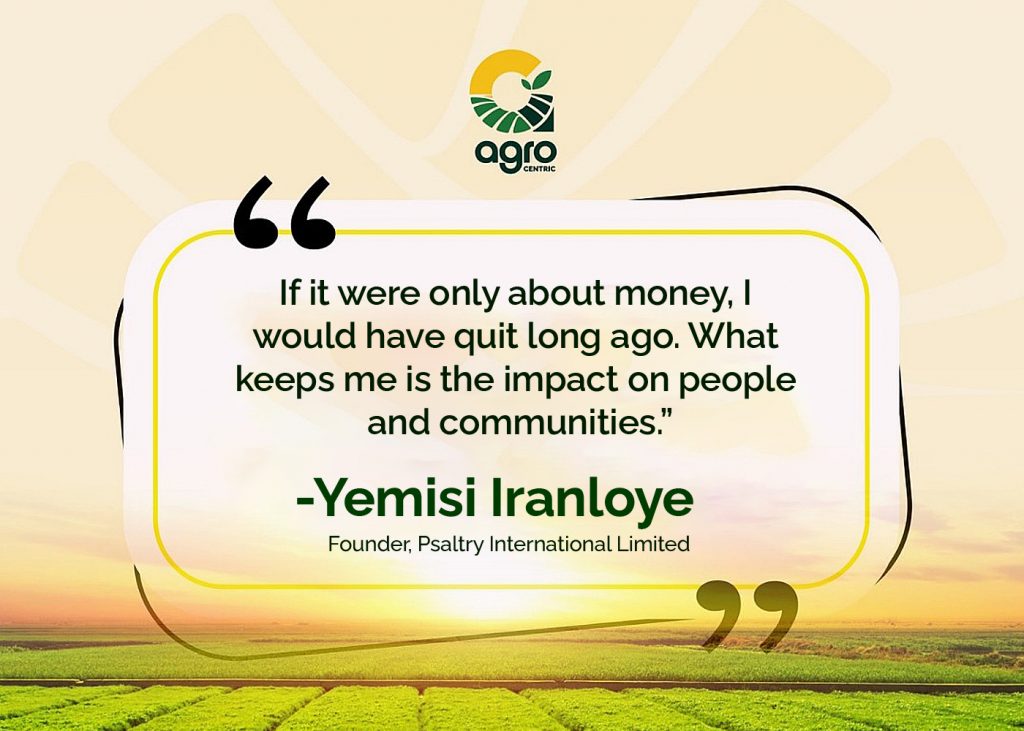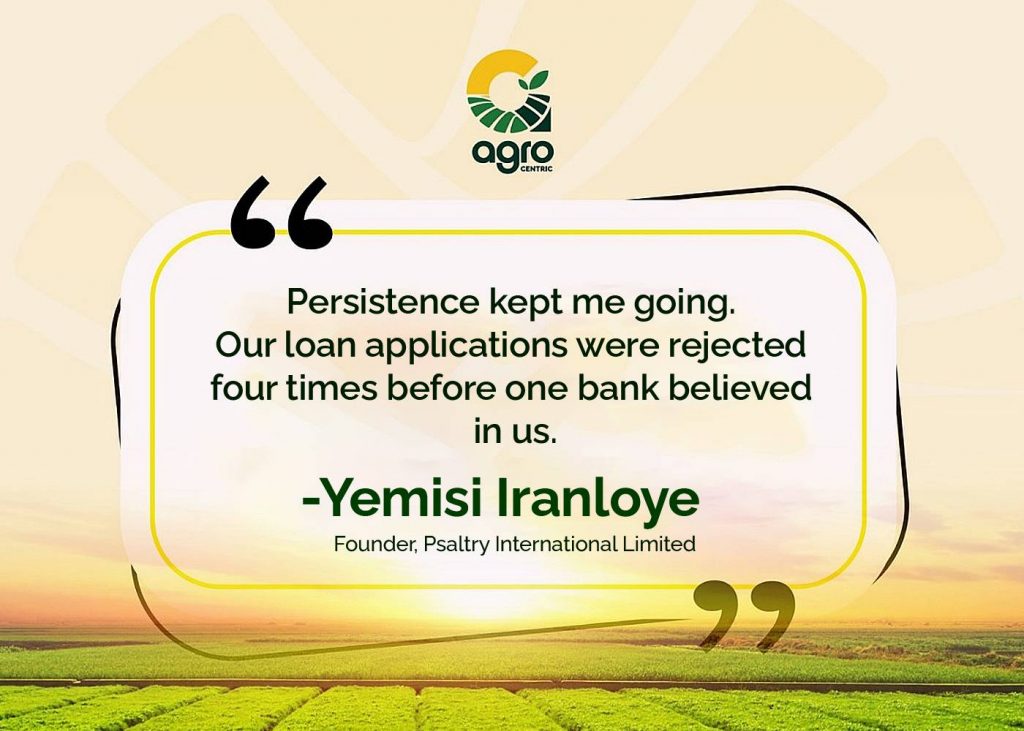
In Nigeria’s tough business environment, where loans are scarce, infrastructure is weak, and policies often shift unpredictably, few entrepreneurs persist. Yet Yemisi Iranloye has not only survived, she has thrived. Known as the Cassava Queen, she has built a globally recognised agribusiness on resilience, innovation, and a refusal to give up, even after her bank applications were rejected four times.
At the helm of Psaltry International, Yemisi has combined tradition with cutting-edge technology to modernise cassava processing. Her factory has drawn youth into a sector often dismissed as outdated. Most notably, she pioneered Africa’s first cassava-based sorbitol factory, overcoming challenges from COVID-19 delays to port congestion.
In this AgroCentric interview, Yemisi reflects on her journey, from early struggles with rejection and financial barriers to scaling an agribusiness that empowers thousands of farmers and places Nigeria on the global cassava map.
Please tell us a bit about yourself.
My name is Yemisi Iranloye, founder and CEO of Psaltry International Limited. We are based in Plot 1, Psaltry Road, Alayide Village, Ado-Awaye, Iseyin LGA, Oyo State, Nigeria, and we produce high-quality cassava flour, glucose, sorbitol, and other cassava-based products.
What early experiences shaped your passion for agriculture and agro-processing?
I’m a biochemist by training. I hold both a first and a second degree in biochemistry. My first job was with Ekha Agro-Processing Ltd, where I got introduced to cassava. I worked there for 10 years, and that’s really where my passion for the crop began.
At the time, President Obasanjo advocated for cassava to be developed as an industrial crop, not just for garri production. We were among the first to embrace that vision and look for ways to add more value to cassava. Before then, I knew little about cassava beyond garri. However, after reading more research from IITA and seeing the government’s interest, I began to understand its potential.
At Ekha Agro-Processing Ltd, we used cassava to produce glucose, and that was my turning point; it showed me how versatile and valuable the crop could be. Since then, cassava has been at the centre of my work.
How exactly did it start? You mentioned there’s a story behind it.
Yes, there is. Ekha Agro had a sister company called E-Tong Agrotech Nigeria Limited, which focused on selling and distributing vitamins and chemicals for poultry. Ekha Agro-Processing Ltd was involved in glucose production, and I led that project.
I was tasked with developing a new line, and I considered two options: papain from papaya or glucose from cassava. We chose cassava because, at that time, it was gaining strong recognition from the Nigerian government and also attracting global attention. That was in 2003. Through that work, I began collaborating with IITA and other programs, and that’s how my journey with cassava began.

How did that interest lead to Psaltry?
While at Ekha Agro, I had a defining moment. One day, an elderly farmer came with his cassava, but everything spoiled because he had been stuck on the road for five days. I felt compassion for him. That’s when it became clear to me: cassava processing only makes sense if factories are located close to farmers.
Two weeks later, I registered Psaltry International, hoping that someday, if I started my own company, I would do things differently. My vision was to create an inclusive business model to uplift smallholder farmers by staying close to them.
You eventually left Ekha Agro-Processing to pursue this dream. What was that like transitioning from employee to founder?
It was tough, and it wasn’t immediate. I stayed in Ekha Agro for another five years after that incident because I didn’t have the funds. I gradually used my salary to buy land; it took me three years. This place was a forest, the roads were bad, and the area was notorious for kidnappings. The farmers were very poor. I had no capital, just the land and my vision.
Banks rejected my applications four times before one finally agreed, only after a top manager at First Bank came to inspect personally. That was how difficult it was. The turning point came when I sold my first three trailer loads of cassava. That day, I knew I could do it. Farming yams, maize, and cassava gave me the confidence to retire early at 40 and dedicate myself fully.
Agriculture in Nigeria is often described as male-dominated. What challenges did you face as a woman?
The first barrier was financial. Convincing the bank to support us early took a lot of effort. Our loan application was rejected four times before we finally got approved, and even then, it only happened after a woman from the bank came down to inspect our operations.
At that time, the barriers for women were much higher. There weren’t many women making strides in agriculture. You would see women leading in education, lecturing, or medicine, but not agriculture. The sector was seen as difficult, and there was doubt about whether women could sustain it. Some people even questioned if women would abandon the farm to focus on family.
Another challenge was the personal questions. I was often asked, “What about your husband?” as if my home life determined whether I could get funding. Not giving convincing answers to those family-related questions could cost you the loan. Thankfully, we managed to push through those barriers, and that’s why we are here today.
How well have you integrated technology into your operations?
Our plant is automated, even though we’re in the middle of nowhere. We use drones for monitoring and mapping, AI tools for planning, and software that gives us a 360-degree view of operations. Technology is central to our model.
Psaltry is the first cassava-based sorbitol factory in Nigeria and Africa. How long did it take to achieve that milestone?
It was a bold step, and we were determined to make it work. Before us, two or three larger companies had tried but failed. When Unilever Nigeria approached us, we carried out product trials, which were later approved by Unilever Global. The journey has not been easy, we’ve worked on this for about seven years. The journey wasn’t easy, we worked on it for about seven years, starting just as COVID-19 hit, which slowed everything down.
Today, the factory has a production capacity of 24 tons per day. Beyond sorbitol, the plant can also produce glucose and maltose, making it a versatile facility. Achieving this milestone took immense resilience, but in the end, we succeeded.

You work with over 5,000 farmers. How do you ensure they thrive with you?
We have a department dedicated to farmers, with about 50 field officers working directly with 300 – 400 farmers each. We provide tractors, herbicides, training, and cassava stems. Farmers then increase yields, and we buy back from them. We deduct what we give them as loans and pay them their profit.
This way, they grow with us. For me, the joy is seeing poor farmers able to send their children to private schools. That kind of impact is worth more than money.
What trends are shaping Nigeria’s agro-processing sector that you are excited about?
Technology. Farmers now use drones for spraying and mapping, and we see more mechanisation, harvesters, planters, and boom sprayers. This makes agriculture attractive to young people. The sector is being modernised, and that’s good news.
Since you started Psaltry, have you ever felt like giving up?
Even now, it’s the vision that keeps me going. Without that, I don’t think anyone could survive this terrain. The Nigerian environment is very difficult. You’re fighting on all sides, banks, police, unstable government policies, while still trying to find a market. For example, some of my goods and chemicals have been stuck at the port for weeks. Nothing is working. Just when you think you’ve overcome one problem, another one begins.
That sounds tough
Yes, you just need to be strong. You have to remind yourself that your purpose is bigger than money. If it’s only about money, you’ll give up. There must be a deeper reason to stay in business.
If you were with Nigerian agricultural policymakers, what three key issues would you advocate for to help agribusinesses thrive and achieve food security in Nigeria?
First, the importation of finished products should be reduced. We need policies that encourage local production, especially for products where raw materials can be sourced from our farmers. This creates a win-win situation: industries thrive, backwards integration supports farming, and millions of people get jobs.
The government can do this step by step: start with tariff increases to discourage imports, then gradually move toward a ban. But whichever way, we can’t keep importing products; we can produce them locally. For example, Nigeria, Africa’s largest population, still imports glucose, starch, and even raw materials for toothpaste despite our high demand for these items. That shouldn’t be the case.
Second, the government must intentionally choose strategic products and police the entire value chain to ensure the success of local production. Policies around the ports need to be addressed as well. When new platforms for clearing goods are introduced, they’re often not tested properly before going live. This causes congestion and prevents businesses from clearing essential raw materials, like chemicals needed for production, for weeks or even months. Without these materials, manufacturing stalls, but banks still expect their interest payments. It makes doing business very difficult.
You mentioned banks earlier on the issue of finance. What’s your take on policies regarding access to funds for agribusinesses?
Access to finance is a long-standing problem. Loan conditions are strict and interest rates are very high, often in double digits. Everyone talks about it, but it remains a major challenge that agribusinesses face in Nigeria.

If the government isn’t doing enough, how can Nigerians in the diaspora contribute?
They can invest directly in agriculture. With the current exchange rates, their capital goes a long way. They can buy land, form cooperatives, and invest in production. At the end of the day, no one will develop Nigeria for us; we have to do it ourselves.
What opportunities do you think remain untapped in Nigeria’s agricultural sector?
There are many opportunities in logistics, mechanisation, fertiliser, and chemical industries. Primary production, secondary processing, and even tertiary industries like packaging and distribution are underdeveloped. There’s also potential in fisheries, dairy, cotton, and milk production. The value chain is vast.
And what about the role of youth in agribusiness?
I think it’s improving. More young people are now coming into the sector.
But what more can be done to attract even more youth and women?
Provide affordable financing and create an enabling environment where they can take risks and succeed.
What mindset has been most important for your success?
I have realised that this work is for humanity, not just money. If it were only about money, I could have left long ago. But the impact on people and communities is what keeps me going.
Looking back, what do you wish you had known before starting?
Finance. I wish I had more financial knowledge at the beginning. It would have saved me from certain mistakes. I had to learn the hard way, on the job.
Where do you see Psaltry and the cassava value chain in five to ten years?
Psaltry’s goal is to meet Nigeria’s demand for glucose, sorbitol, and hydrogen. A large volume of these products is imported, so Psaltry aims to ramp up the lines to meet the growing demand.
Finally, what advice would you give young entrepreneurs entering agriculture?
Start small. Dream big, but start with an amount you can lose and recover from. You might fail, but when you try again, you’ll have learned lessons that prepare you to succeed.
Thank you! This is impressive. You can learn more about Psaltry International and how its model promotes inclusive growth and transforms agriculture across Africa.